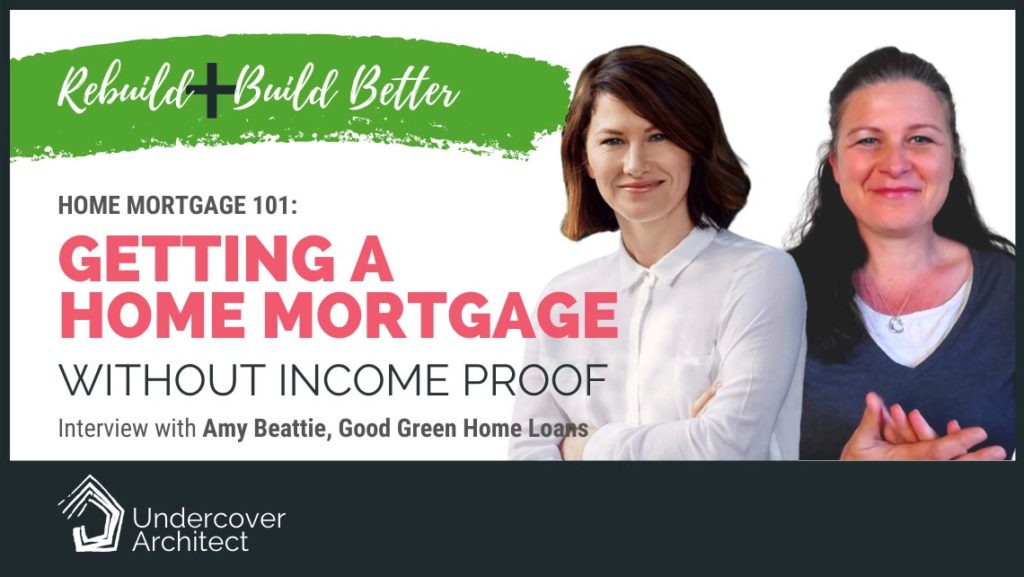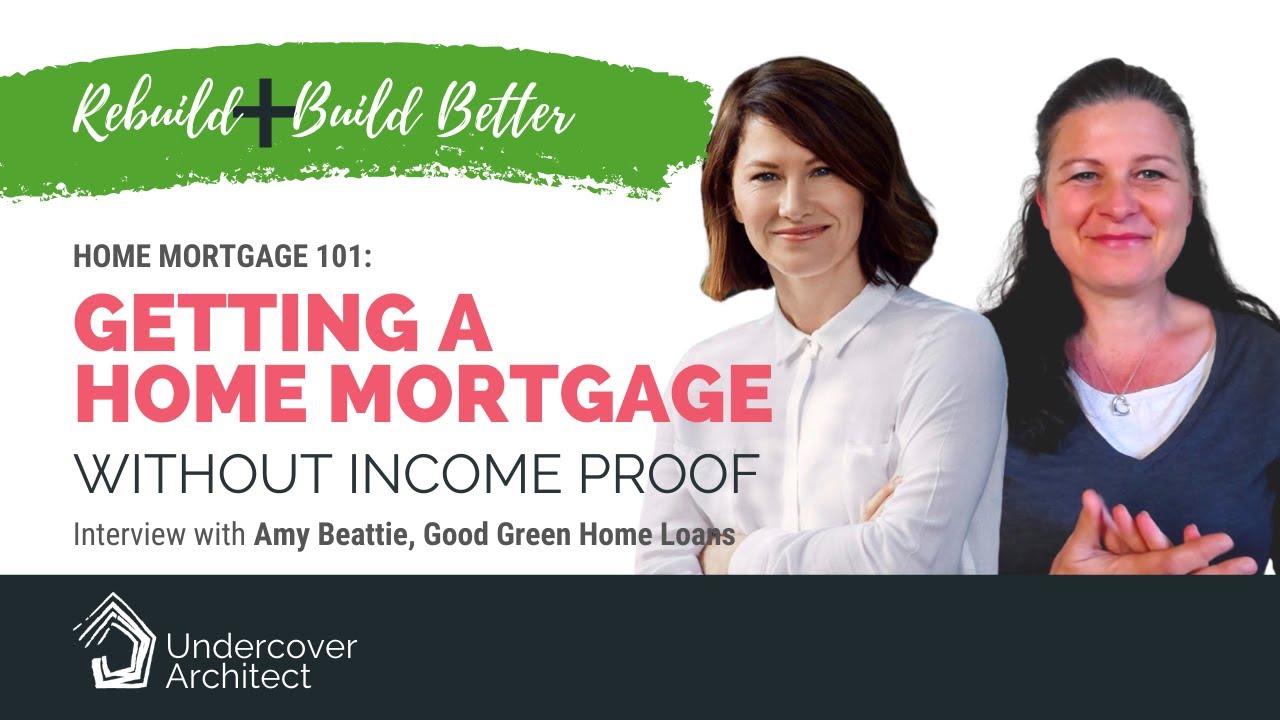
How do you get a home mortgage after losing your home and without income proof?
For many who suffer the loss of a home due to bushfire, they may also lose their jobs or be unable to work.
This can make rebuilding especially challenging – especially if their insurance settlement has paid out their mortgage and getting finance proves difficult.
Learn more as Amy Beattie, Mortgage Broker, explains what options might be available to those in this position.
In this video, I speak with Amy Beattie, Mortgage Broker and owner of Good Green Home Loans.
This is part 6 of my conversation with Amy. You can watch the other parts here:
Part 1 | Part 2 | Part 3 | Part 4 | Part 5
Good Green Home Loans is here to help you find the right home loan at a great rate – using only environmentally responsible lenders who aren’t using their profit and power to support the fossil fuel industry.
In this video, I asked Amy this question:
“One of the challenges that occurred for homeowners in 2009 Victorian fires was that the insurance settlements they received were actually full payouts of mortgages.
And so then they were left without a mortgage, no income due to not being able to work, or the fire destroying their business as well, and then no ability to secure finance.
What options might there be for people dealing with this now, or what alternatives there are for people?”
So let’s dive in.
INTERVIEW TRANSCRIPT
Amelia Lee + Amy Beattie (Good Green Home Loans)
[Amelia Lee]: Now in terms of understanding the position that some people are in after the bushfires, I know from the research I’ve been doing with the 2009 Victorian fires that one of the big problems when it came to people losing their properties or suffering significant damage was that their insurance payouts ended actually just being that they had their mortgages paid out in full.
And speaking to people who were there at that time and working with people on the ground, this ended up being a big problem for people because, whilst it seemed great to get your mortgage paid out, if you were then with no house, your block of land, you might have lost your business, lost your job, and didn’t have then a reliable income, no bank was going to lend you money to be able to then turn around and build your new property. And you’ve got no cash from your insurance company to get started either.
So how have you seen, or have you seen that this situation might be handled slightly differently in the current environment?
Or what options there might be for people in terms of other avenues and other … I don’t know. I mean, it’s such a tricky thing, and I’m not sure if there is anything. But I suppose we’ve got … Whether there’s any alternatives for people in terms of exploring this with financing and how they explore it for their project?
[Amy Beattie]: Well, when you’re talking about hypothetical situations where this hasn’t happened yet, but people are trying to mitigate for it … For me, it all comes back to understanding the risks yourself, not just trying to meet the criteria of the bank, but understanding the risk criteria yourself. And, sadly, it’s the insurance industry that we’re all kind of hinged on.
But the importance of … We pay a fortune to insure our cars, and in the scheme of things, what we’re insuring there is so minor in our overall financial position. And we’re very … I don’t know the statistics on it, but I just know from my experience that many people are not insured adequately, personally, whether it’s their income, or their property, or their life. And most people don’t really understand the fine print of their insurance policies.
So that’s what it comes around to for me when we’re talking about hypothetically, and before you’ve embarked on taking out a home loan for your dream home, is the ‘what if this happened, and what would I do about it?’ And if the answer is ‘I’d be in big trouble’, you need to mitigate that risk somehow. And I can’t express that more. But it’s always a balance of how much that costs to the likelihood of it occurring.
But I guess in hindsight you would never say ‘I wish I didn’t have that insurance policy’ when you needed it. So for those people that are in situations like that, where their insurance was inadequate, whatever the insurance was, whether it was those personal insurances or the building insurance…The industry itself, I haven’t seen anything really yet in terms of the industry as a whole finance industry, as a whole, wanting to address how we’re going to help people like that.
So I probably … The only thing I can suggest is that you’ve got to sooner rather than later find someone that you can trust and who has your best interests at heart to go to and begin the journey of trying to find out how to get back on your feet. So whether that’s financial counseling services, and probably a really good place to start. But a broker would be a good place to start too. A broker with a really good heart would be key.
Because they will… They’ll almost certainly be banks that are willing to lend money to the people who are desperate to turn their circumstances around, but it will very likely be at a cost as well, a significant cost. And, you know, potentially lining somebody’s pockets when that isn’t the right answer. So, yes, you just got to be really wary of the not so good people out there too, I think. You’ve got to find someone you can trust and who you know cares. And yes the financial counselling services I think would be the best place to start.
[Amelia Lee]: That’s fantastic advice Amy. I think that that thing of actually just getting people who do care in your corner can make such a critical difference to you getting the right information that you need. Because often times, you’re being sort of forced to make decisions very quickly by those that don’t necessarily have the best intentions.
And so it is that… Having the wherewithal to say ‘no, stop, I just need to find these things out and make sure that I’m protected’ so that you don’t get yourself backed into a corner unnecessarily.
And I think it’s always really interesting to see when you do speak to a broker, there’s been times where we were doing projects, and we thought it was going to be impossible to access funds, but when we sat down and actually sort of laid out all of the puzzle pieces that we were dealing with, then there was always an avenue through. It just required understanding ‘okay, we might have to wait to satisfy X, or that might mean that we could do this as an alternative’.
And it is… You can’t actually make those decisions until you’ve got all of the information. So it’s lovely to know that there’re brokers like you who can help people really lay out that picture for themselves.
And a lot of the other guests that we’ve been bringing on as part of this Rebuild + Build Better series who can share knowledge and expertise with people to help them make informed decisions rather than getting pushed into something that they don’t want to do and then getting stuck.
[Amy Beattie]: Yes, and one thing that came to mind when you were saying that is just that … In my role, I often feel like culturally we … clients on the other side of the desk, they get excited by the ‘yes’. And it isn’t necessarily the best thing. So it’s just doing things in a really considered, well thought out way, speaking to many people, and definitely not relying on the wrong people, I guess.
And that can sometimes be people with great intentions that, you know, ‘when I went and saw my broker, he said this, or she said this and so … You can do this’ but it’s not necessarily right for you. So, I think there has to be that trust, the integrity, the experience, and not to just sort of jump at the first thing you hear ‘yes’ to.
Because that can just be fraught with danger. So the more knowledge you can acquire before you make any big decisions on something this huge it’ll be financially almost always the biggest decision you’ll ever make will be to do with your borrowings for a home and your superannuation.
So, don’t rush decisions, just when you hear something you want to hear. Surround yourself with the right people and good people and get the best advice.
[Amelia Lee]: That’s so true. I see lots of people fall for the things that they want to hear. And yes, my approach is that often times you’ve ignored… Like when I’ve seen things go poorly for people, it’s because they ignored a raft of people who told them what they needed to hear, and they went with the person who told them what they wanted to hear and then ended up in a pickle.
And so it is that thing of trying to check the credentials, establish the criteria, really know what your priorities are personally and find alignment with experts who can support you. And do demonstrate a caring kind of invested attitude in you achieving outcomes that are going to be suitable and not cripple you financially and not get you caught out.
So yes, I can imagine it’s a huge responsibility as a broker. I saw somebody post recently in a Facebook group that their home loan … they’ve been speaking to a broker who suggested that they get a personal loan to sort out their deposit to then be able to go and get their mortgage and it was like ‘holy cow, that sounds like a recipe for disaster!’
And it’s like … Actually the conversations you have with your broker at this point are critical for you not crippling yourself financially and not getting yourself into a lot of trouble debt wise. In terms of it is that thing you must feel a huge amount of responsibility in how you advise people in this regard.
[Amy Beattie]: Yes, that’s right. And it’s a fine balance too of offending people because you sort of say ‘I don’t think this is the right idea for these reasons …’ and it might be based on transaction history on their bank account. And that can feel personal. So it’s a fine art.
I think that ultimately the client gets to choose what they do next. So this isn’t the right way to put it, you win some you lose some, but I definitely have seen clients go somewhere else and come back around eventually.
So, you know, get lots of opinions. Don’t rely on one person. And if your gut instinct is that that person is the right person, challenge that too. And just check. Check with one or two more, because it’s only going to be knowledge and personal growth and all of those things will help you go down the right path in the long run.
[Amelia Lee]: Fantastic, Amy, thank you so much. It’s been so great speaking with you and you’ve shared all of your wisdom so generously. I really appreciate it.
[Amy Beattie]: My pleasure. Thank you so much for having me Amelia. It was lovely to chat.
THIS IS PART 6 OF MY INTERVIEW WITH AMY BEATTIE, GOOD GREEN HOME LOANS. WATCH PART 1 HERE AND PART 2 HERE AND PART 3 HERE AND PART 4 HERE AND PART 5 HERE.
This interview is part of our Rebuild + Build Better series.
Be sure to stay tuned as we share more information and expertise in helping you rebuild after bushfires, or build homes more resilient to climate conditions and in bushfire prone areas.
Resources mentioned in this video:
Get in touch with Amy here >>> https://www.goodgreenhomeloans.com.au

 With over 30 years industry experience, Amelia Lee founded Undercover Architect in 2014 as an award-winning online resource to help and teach you how to get it right when designing, building or renovating your home. You are the key to unlocking what’s possible for your home. Undercover Architect is your secret ally
With over 30 years industry experience, Amelia Lee founded Undercover Architect in 2014 as an award-winning online resource to help and teach you how to get it right when designing, building or renovating your home. You are the key to unlocking what’s possible for your home. Undercover Architect is your secret ally
Leave a Reply